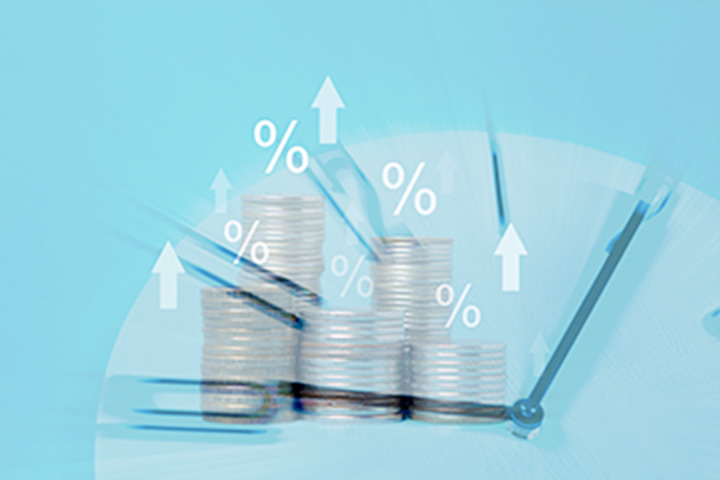Capital gains tax: how will it affect your portfolio?

Keytrade Bank
keytradebank.be
July 03, 2025
(updated February 23, 2026)
3 minutes to read
Investors will soon be required to pay up to 10% over their profits. Discover the impact and how to prepare.
Update 23 February 2026
1. What is capital gains tax?
Capital gains tax is a new 10% tax on profits made by private individuals on the sale of investments. The government wants to avoid this affecting small investors. This is why an exemption of €10,000 per year is in effect. Providing your annual profit does not exceed €10,000, you will not be required to pay this tax. The exemption of €10,000 will be adjusted for inflation each year.
Many investors invest for the longer term and hold their investments for several years. Anyone who does not utilise the exemption will accumulate an additional €1,000 each year for five years. In other words, if you only realise capital gains every five years, the exemption can increase to €15,000 (€30,000 for couples).
For shareholders with a high stake in a company (at least 20%), the following rates are predicted:
- Capital gains up to €1,000,000: An exemption per five-year period and per person. This means it is not possible to receive an exemption for €1,000,000 every year, and each shareholder will need to achieve 20% to benefit from the exemption. Family members are therefore not allowed to 'pool' their shares to reach the 20% threshold.
- Between €1,000,000 and €2,500,000: 1.25%
- Between €2,500,000 and €5,000,000: 2.5%
- Between €5,000,000 and €10,000,000: 5%
- Above €10,000,000: 10%
This tax applies to natural persons (individuals) and shareholders of all companies – and therefore not to companies themselves. Legal entities subject to corporation tax are also included. This includes non-profit organisations, except for those that can receive donations by means of a tax certificate.
Good to know : speculative trading and day trading non-professionally are already subject to a capital gains tax of 33%.
2. What if you only sell your shares after 10 years?
For a long time, there was uncertainty surrounding whether an exemption would apply for investments held for over 10 years. This exemption has not come to pass.
However, long-term investors and passive investors do have an investment horizon of 10 or 20 years or longer, and do not wish to sell prematurely. Even so, this does mean that if their profits exceed €10,000 on the day they finally decide to sell, they will be taxed. The government has partially addressed this problem by introducing a system of transferable exemptions (€1,000 extra for five years).
3. When will this tax go into effect?
At the end of June, the senior government ministers reached an agreement on the terms involved. The intention was to pass the law in 2025, with the aim of generating revenue from 2026. However, due to the absence of a budgetary agreement, it remains unclear whether this tax will actually enter into force on 1 January 2026. The preliminary draft of the new tax has not yet been definitively approved by the Council of Ministers. This will only happen if a budgetary agreement is reached. However, this does not mean there will be no capital gains tax from 1 January. If the federal government reaches an agreement by Christmas, an announcement may be published in the Official Gazette at the end of December. This message may announce that the capital gains tax will enter into force on 1 January 2026, subject to a later vote on the bill in Parliament.
4. Which assets are subject to capital gains tax?
The tax targets realised capital gains on financial assets in the broadest sense. This includes shares, bonds, funds and trackers, investment gold, cryptocurrencies, life insurance contracts from Branches 21, 23, and 26, and realised capital gains from currency trading. It is important to know that any savings you accumulate through pension savings, long-term savings or group insurance are not subject to tax. Investments qualifying for tax relief under the tax shelter for start-ups or scale-ups would also be exempt. Through this system, an individual could invest up to €100,000 per year in a start-up or scale-up and receive tax relief of up to 45% on the invested amount.
5. Are unrealised capital gains taxable?
No, only capital gains realised in the event of a sale will be subject to taxation. This means you will not have to pay as long as you hold onto your investments. That is the current plan, anyway.
6. What about staggered purchases?
If you purchased the same share at different times, the first in, first out (FIFO) method will be applied in the event of a sale. On selling, the price of the shares that were purchased first will be used first.
7. Are previous capital gains taxable?
No, the calculation of capital gains is based on the situation as at 31 December 2025. A snapshot of each investment portfolio is taken on that date. If the effective purchase price was higher, then that particular purchase price may be taken.
8. Can losses be deducted?
Any losses should be deducted within the same year and within the same category of financial assets. As far as is known, losses cannot be carried over to subsequent years. Please also note that only losses incurred after the 'snapshot' taken on 31 December 2025 will be considered. Historical losses before that date are therefore not deductible.
9. Can costs be deducted?
There is no clarity on this matter so far. Transaction costs may be deductible, but that has yet to be confirmed.
10. Is this tax also imposed on a gift or inheritance?
No. A gift or inheritance is not regarded as a realisation of capital gains. Therefore, no capital gains tax needs to be paid at that time. The deferred capital gains tax does shift: the heir or beneficiary takes over the original purchase value and will later owe tax on the sale if they realise capital gains.
11. What about the Reynders tax?
The Reynders tax is a 30% tax on capital gains of certain investment funds or ETFs that invest (partly) in bonds. The Reynders tax may continue to exist, but it will only be applied to the interest component. Profits that are not yet subject to the Reynders tax may now qualify for capital gains tax.
12. What about foreign currency investments?
If, for example, you invest in US shares in USD and realise a capital gain that exceeds the exempted limit, but ultimately ends up below it upon conversion to EUR due to an unfavourable exchange rate, it is unclear how this should be calculated. The question is whether the 'official' capital gain in EUR should be based on the rate at the time of purchase and sale, or on the basis of your actual received cash flow after conversion.
Furthermore, which exchange rate applies in case of multiple purchases made at different times? Will the calculations use a weighted average or look at the specific rates for each transaction? What about a dollar position you have had for some time and which has changed banks or brokers in the meantime?
As with the other issues, the final legislative texts will reflect the legislator's decisions on these points. 13. How will the tax be collected? It is still unclear whether banks will withhold tax on your behalf. There are two possible outcomes.
- Automatic deduction: The bank immediately deducts 10% on each sale. If you wish to take advantage of the exemption or offset losses, you must indicate this yourself in your tax return.
- Opt-out via tax return: You choose to declare everything yourself in your annual tax return. The bank then submits a tax return to the tax authorities.
In any case, you are required to declare anything that does not go through a Belgian bank – such as capital gains from cryptocurrency transactions, physical gold or investments abroad.
14. Could the tax rate increase in future?
Although there was no general Belgian capital gains tax before this, investors fear the rate may go up further in future. This is what happened to the withholding tax, which increased from 15% to 30% over time. Whether the capital gains tax will go up in future is unknown, but history suggests such a course cannot be ruled out.


